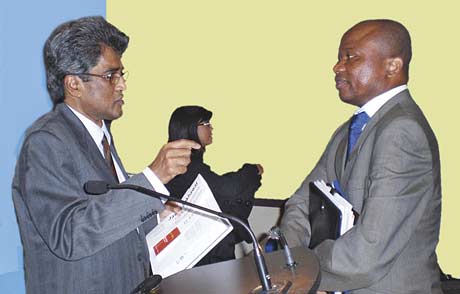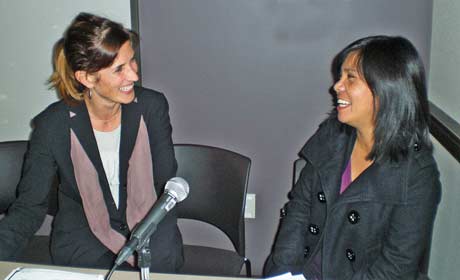Greater Toronto

participants last Saturday
(William Doyle-Marshall pix)
The task of getting people out of poverty is daunting as half of the world's population survive on less than $2 a day. Global poverty is the most important economic and social dilemma of our time. David C. Onley, Lieutenant Governor
By William Doyle-Marshall
There is an urgent need for Canadians and North Americans as a whole to begin reorienting their value system and recognize that if they care about people, the overall wealth of the planet will be better. This hypothesis was presented Saturday at the Toronto International Microfinance Summit by Jeff Rayman, president of Secutor Capital, during a lunchtime keynote address.
Rayman who is currently applying microfinance systems in Rwanda was adamant that if North Americans remain selfish in their values there will be an exponential depletion of wealth. "If we remain generous we will have an exponential growth of wealth," he advised.
With this in mind the filmmaker-turned- entrepreneur advised, change in attitude requires a multi platform notion. This, he predicts, would evolve into overall improvement in lifestyle through access of capital. He hoped people will be honest: take the money (which becomes accessible to them) and do good things with it. It's a long process; it's not going to happen overnight but it has to happen if we want to make a change in this world, Rayman concluded.

(William Doyle-Marshall pix)
Ontario's Lieutenant Governor David C. Onley welcomed guests to the summit which he considered very important. At a fundraising gala designed to support the empowering potential and financial inclusion and the ideals of microfinance to making a difference in this world, he hoped all participants, especially college and university students would return home with a greater understanding of the issues involved in microfinance and its power as a tool to reduce poverty.
Onley admitted the task of getting people out of poverty is daunting as half of the world's population survive on less than $2 a day. "Global poverty is the most important economic and social dilemma of our time. Few would claim that microfinance is the magic bullet that will eliminate global poverty but microfinance is one of the most promising tools for helping the poorest amongst us and also I believe gives the greatest opportunity to then grow into something better," the Lieutenant Governor said.
"It can bring about powerful social change by enabling families to make a little bit extra; keep their kids healthy and in school and open the doors to economic opportunity to future generations where before there would be absolutely none," he continued.
Summit discussions evolved around the theme. "From Microcredit to Financial Inclusion: Making a Difference in Our World". Inclusion not only applies to issues related to other people who may have disabilities but also includes people who through no fault of their own necessarily, sometimes just by accident of birth, find themselves in situations that we could find hard to imagine; certainly nothing like what we experience in Canada, Onley observed. We need to try to do something that can work and that's what microfinance is all about. It goes back a long way even into the 1720s.
Phil Smith, keynote speaker at the gala told patrons that microfinance generally doesn't cause damage. "At best we can help people a lot. I like microfinance as there is a lot of ways we can help people improve their lives," he counseled.
As he encourage summit participants to become involved in microfinance, Smith stressed that microfinance creates the conditions where people can improve their own lives. "Everybody in here can help one person with microcredit. One of the great things about a micro loan is that it gets paid back. 95 to 98% of them do get paid back which, by the way, is way higher than a credit card recovery rate in either Canada or the United States. They do get paid back," he added.